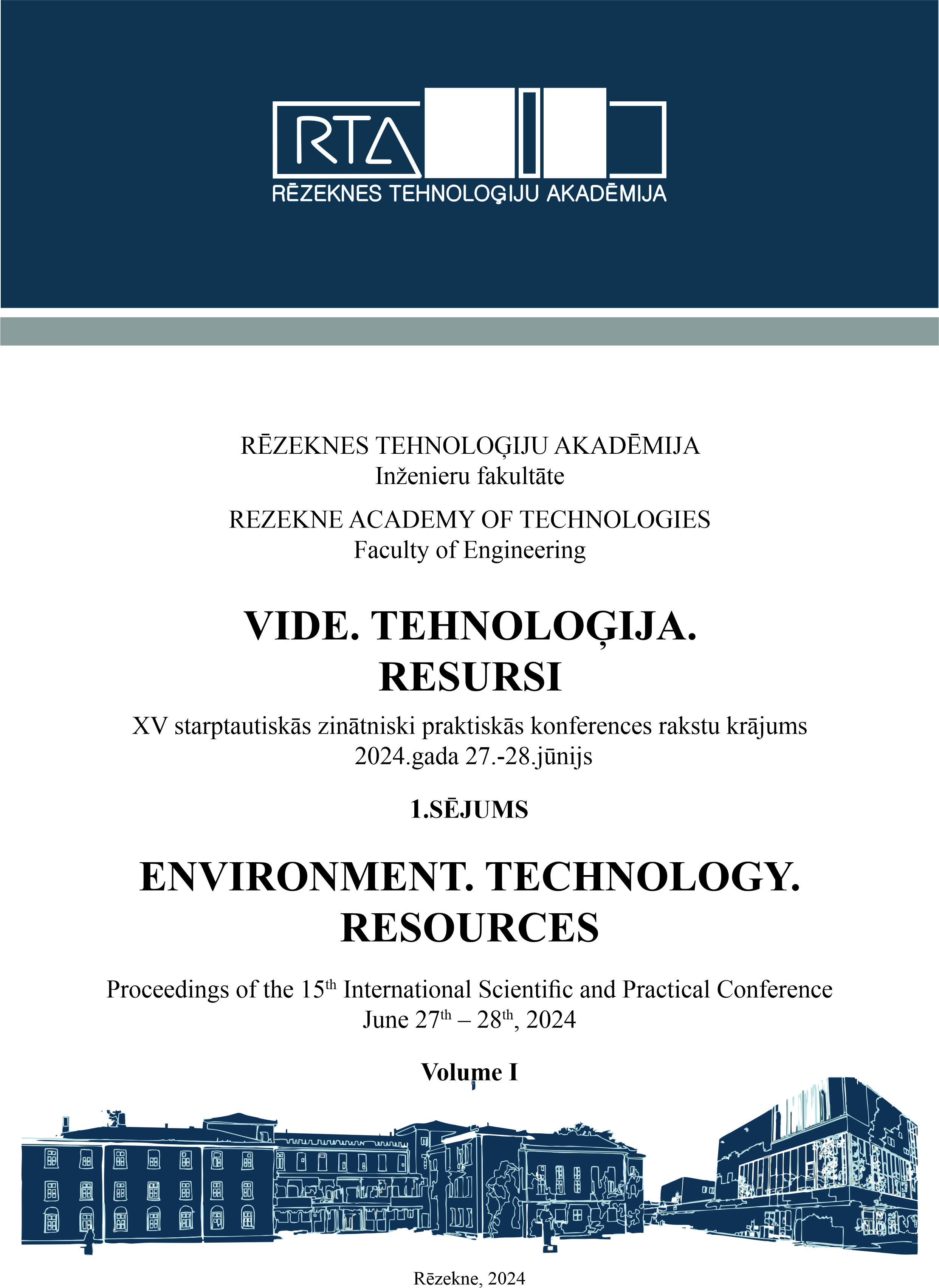CRITICAL REVIEW OF BULGARIAN LEGISLATION RELATED TO CIRCULAR ECONOMY
DOI:
https://doi.org/10.17770/etr2024vol1.7965Keywords:
circular economy, Waste Management Hierarchy, Polluter PaysAbstract
This article presents the results of a critical review of Bulgarian legislation in the field of circular economy. It also defines recommendations and guidelines on creating favourable conditions for transition from linear to circular models based on all life cycle stages of processes, products and services.
The main analysed policy document, directly addressing circular economy, is the Strategy and Action Plan for the transition to a circular economy of the Republic of Bulgaria for the period 2022-2027. It lays down the strategic framework towards achieving resource efficiency by applying waste management hierarchy, i.e. waste prevention, reuse and recovery through recycling, reducing landfilling and limiting harmful impact on the environment and human health.
The main pieces of legislation relevant to circular economy are the Waste Management Act and by-laws implementing Directive 2008/98/EC on waste (Waste Framework Directive), Directive 94/62/EC on packaging and packaging waste (Packaging Waste Directive), Directive 1999/31/EC on the landfill of waste (Landfill Directive), Directives 2000/53/EC on end-of-life vehicles, 2006/66/EC on batteries and accumulators and waste batteries and accumulators, and 2012/19/EC on waste electrical and electronic equipment, etc.
The review of provisions in the Waste Management Act and Local Taxes and Fees Act on implementing the ‘Waste Management Hierarchy’ and ‘Polluter Pays’ principles shows the need to promote economic incentives. Bulgarian municipalities should revise their ordinances and calculate local waste fees based on the quantity of waste generated (also requested by the current EC infringement procedure for failure to implement the ‘Polluter Pays’ principle at municipal level).
‘Eco design’ provisions are in place, and provisions protecting customers’ right to repair are expected. In addition to implementing EU acquis, it is possible to promote further measures to reduce environmental impact of products throughout their entire life cycle.
The critical review also overs the main documents tackling climate challenges, i.e., the Climate Change Mitigation Act and by-laws, and the National Strategy and Action Plan by 2030 for adaptation to climate change of the Republic of Bulgaria, defining the framework for actions for adaptation to climate change and priority directions.
The review of ‘horizontal’ environmental legislation of the Republic of Bulgaria, i.e., provisions of the Environmental Protection Act and by-laws on strategic environmental assessment (SEA), environmental impact assessment (EIA) and integrated pollution prevention and control (IPPC), reveals the potential to address circular economy aspects in the recommendations issued as part of the relevant competent authorities’ permits.
Other potential areas are the environmental protection standards and ESG (Environmental, Social, and Governance) as a framework for environmental and social impact. Last but not least, the review considers circular economy financing opportunities.
Downloads
References
H. Wiesmeth, Implementing the circular economy for sustainable development. Elsevier, 2021, pp. 19-31.
В. Иванова, Кръговата икономика в България – перспективи и предизвикателства, Научни трудове на УНСС, том 5/2019. [Online] Available:
https://research.unwe.bg/uploads/ResearchPapers/RP_vol5_2019_No14_V%20Ivanova.pdf [Accessed Feb 24, 2024]
M. Sillanpää, C. Ncibi, The circular economy: case studies about the transition from the linear economy. Elsevier, 2019, https://doi.org/10.1016/B978-0-12-815267-6.00001-3.
EU Circular Economy Action Plan [Online]. Available: https://environment.ec.europa.eu/strategy/circular-economy-action-plan_en [Accessed Feb 24, 2024].
Waste Management Act (Prom. SG N 53 of 13/07/2012, last supplemented SG N108 of 30/12/2023).
Directive 2008/98/EC on waste (Waste Framework Directive), Directive 94/62/EC on packaging and packaging waste (Packaging Waste Directive), Directive 1999/31/EC on the landfill of Waste (Landfill Directive), Directives 2000/53/EC on end-of-life vehicles, 2006/66/EC on batteries and accumulators and waste batteries and accumulators, and 2012/19/EC on waste electrical and electronic equipment.
Local Taxes and Fees Act (Prom. SG N 117 of 10/12/1997, last amended and supplemented SG N 106 of 22/12/2023).
S. Goranova, K. Anguelov, Circular economy and „polluter pays” principle in Bulgarian municipalities, Entrepreneurship and sustainability issues [to be published].
Climate Change Mitigation Act (Prom. SG N 22 of 11/03/2014, last amended SG N 16 of 23/02/2024).
National Strategy and Action Plan by 2030 for adaptation to climate change of the Republic of Bulgaria, defining the framework for actions for adaptation to climate change and priority directions (adopted by Council of Ministers Decree N 621 of 25/10/2019)
Fixing the economy to fix climate change, Ellen MacArthur Foundation [Online]. Available:
https://www.ellenmacarthurfoundation.org/topics/climate/overview [Accessed Feb 24, 2024].
Act on Technical Requirements to Products (Prom. SG N 86 of 01/10/1999, last supplemented SG N 105 of 11/12/ 2020).
Eco Design Directive 2009/125/EC.
Proposal for Ecodesign for Sustainable Products Regulation, 2022. [Online]. Available:
https://environment.ec.europa.eu/publications/proposal-ecodesign-sustainable-products-regulation_en [Accessed: Feb 24, 2024].
Environmental Protection Act (Prom. SG N 91 of 25/09/2002, last amended SG N 102 of 08/12/2023).
Directive 2001/42/EC on strategic environmental assessment (SEA Directive), Directive (2011/92/EU as amended by 2014/52/EU on environmental impact assessment (EIA Directive) and Directive 96/61/EC on integrated pollution prevention and control (IPPC Directive).
Eunomia and COWI contracted by the European Commission, Study on investment needs in the waste sector and on the financing of municipal waste management in Member States, 2019. ISBN 978-92-76-09502-6. doi:10.2779/769124.
D. Stoilov, D. Tonev, K. Anguelov, K. Hadzhiyska, Energy Planning in Bulgaria, 2022, V International Conference on High Technology for Sustainable Development (HiTech), Sofia, Bulgaria, 2022, pp. 1-6, doi: 10.1109/HiTech56937.2022.10145524.
D.Stoilov, Methodology for strategic planning of the national energy industry, VI International Conference on High Technology for Sustainable Development (HiTech), Sofia, Bulgaria (in press), 2023.
D. N. Wise, D. Stoilov, Energy Integration in the European Union – Traditional Approaches and Future Research Avenues, 2023, 13th Electrical Engineering Faculty Conference (BulEF), Varna, Bulgaria, 2021, pp. 1-7, doi: 10.1109/BulEF53491.2021.9690794.
K. Hadzhiyska, D. Stoilov, Multi-Criteria Analysis Approaches for Energy System Development Scenario — Review, 2023, 18th Conference on Electrical Machines, Drives and Power Systems (ELMA), Varna, Bulgaria, pp. 1-9, doi: 10.1109/ELMA58392.2023.10202557.
D. Nikolova, D. Stoilov, Factors Influencing the Public Sentiment on Nuclear Energy Investment in European Union Member States, 2023, 18th Conference on Electrical Machines, Drives and Power Systems (ELMA), Varna, Bulgaria, pp. 1-9. doi: 10.1109/ELMA58392.2023.10202457.
Downloads
Published
Issue
Section
License
Copyright (c) 2024 Sylvia Goranova, Kiril Anguelov

This work is licensed under a Creative Commons Attribution 4.0 International License.



